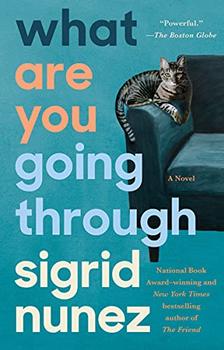Summary | Excerpt | Reading Guide | Reviews | Beyond the Book | Readalikes | Genres & Themes | Author Bio

When we go, the man said, pretty as it might be to think so, we will not be replaced by a race of noble and intelligent apes. Comforting, perhaps, to imagine that, with humans extinct, the planet might have a chance. Alas, the animal kingdom was doomed, he said. Though none of the evil would be of their making, the apes and all the other creatures were doomed along with us-those that human activity would not have annihilated already, that is.
But say there was no nuclear threat, the man said. Say, by some miracle, the world's entire nuclear arsenal had been pulverized overnight. Would we not still be faced with the perils that generations of human stupidity, shortsightedness, and capacity for self-delusion had produced ...
The fossil fuel industrialists, the man said. How many were they, how many were we? It beggared belief that we, a free people, citizens of a democracy, had failed to stop them, had failed to stand up to these men and their political enablers working so assiduously at climate change denial. And to think that these same people had already reaped profits of billions, making them some of the richest people ever to have lived. But when the most powerful nation in the world took their side, swaggered to the very forefront of denial, what hope did Planet Earth have. That the masses of refugees fleeing shortages of food and clean water caused by global ecological disaster would find compassion anywhere their desperation drove them was absurd, the man said. On the contrary, we would soon see man's inhumanity to man on a scale like nothing that had ever been seen before.
The man was a good speaker. He had an iPad on the lectern in front of him, to which his gaze fell from time to time, but instead of reading straight from the text he spoke as though he'd memorized every line. In that way he was like an actor. A good actor. He was very good. Not once did he hesitate or stumble over a word, but nor did the talk come off as rehearsed. A gift. He spoke with authority and was nothing if not convincing, clearly sure of everything he said. As in the article I'd read and on which the talk was based, he supported his statements with numerous references. But there was also something about him that said that he didn't really care about being convincing. It was not a matter of opinion, what he said, it was irrefutable fact. It made no difference whether you believed him or not. This being the case, it struck me as odd, it struck me as really truly odd, his giving that talk. I had thought, because he was addressing people in the flesh, people who'd come out to hear him, that he would take a different tone from the one I remembered from the magazine article. I had thought that this time there'd be some, if not sanguine, at least not utterly doomster takeaway; a gesture, at least, to some possible way forward; a crumb, if only a crumb it be, of hope. As in, Now that I've got your attention, now that I've scared the bejesus out of you, let's talk about what might be done. Otherwise, why talk to us at all, sir? This, I was sure, was what other people in the audience must also have been feeling.
Cyberterrorism. Bioterrorism. The inevitable next great flu pandemic, for which we were, just as inevitably, unprepared. Incurable killer infections borne of our indiscriminate use of antibiotics. The rise of far-right regimes around the world. The normalization of propaganda and deceit as political strategy and basis for government policy. The inability to defeat global jihadism. Threats to life and liberty-to anything worthy of the name civilization-were flourishing, the man said. In short supply, on the other hand, were the means to combat them... .
And who could believe that the concentration of such vast power in the hands of a few tech corporations-not to mention the system for mass surveillance on which their dominance and profits depended-could be in humanity's future best interests. Who could seriously doubt that these companies' tools might one day become the most amazingly effective means to the most ruthless imaginable ends. Yet how helpless we were before our tech gods and masters, the man said. It was a good question, he said: Just how many more opioids could Silicon Valley come up with before it was all over. What would life be like when the system ensured that the individual no longer even had the option to say no to being followed everywhere and constantly shouted at and poked like an animal in a cage. Again, how had a supposedly freedom-loving people allowed this to happen? Why were people not outraged by the very idea of surveillance capitalism? Scared right out of their wits by Big Tech? An alien one day studying our collapse might well conclude: Freedom was too much for them. They would rather be slaves.
Excerpted from What Are You Going Through by Sigrid Nunez. Copyright © 2020 by Sigrid Nunez. All rights reserved. No part of this excerpt may be reproduced or reprinted without permission in writing from the publisher.
Your guide toexceptional books
BookBrowse seeks out and recommends the best in contemporary fiction and nonfiction—books that not only engage and entertain but also deepen our understanding of ourselves and the world around us.